Comparing Early and Later Traditional Stories (I)
£3.00
Activities in this lesson include comparing the features of early and later traditional stories, learning how to structure a report, using templates and writing a report outlining the difference between early (simple) and later (complex) traditional stories.
There is a five-minute evidence-based CPD activity at the end of this lesson which will develop classroom teachers’ skill set. This CPD consists of a research extract on peer assessment with a five-minute activity based on this extract.
Description
These evidence-based learning (EBL) lessons are based on classroom practice that has been proven, by research, to maximise thinking, learning and attainment. From an extensive review of educational research, we identified the eight key classroom thinking and learning skills that were common across these research papers. We named these eight key skills “EBL skills”.
EBL skills have been proven by research to maximise learning because they combine the most productive thinking skills with the most effective learning behaviours. Each of our evidence-based learning lessons uses the English curriculum as a framework through which the eight EBL skills are delivered.
Teachers also have the opportunity to add to their own skill set or refresh their existing skills with our five-minute CPD activity, based on one of the EBL skills used in this lesson.
The skills in bold below are the EBL skills developed in this Traditional Stories lesson. Click on each skill to learn more about that skill.
- Collaboration
- Thinking Skills
- Peer Assessment
- Peer Teaching
- Self-Assessment
- Metacognition
- Self-Regulation
- Independent Learning
1 review for Comparing Early and Later Traditional Stories (I)
Only logged in customers who have purchased this product may leave a review.
Related products
-
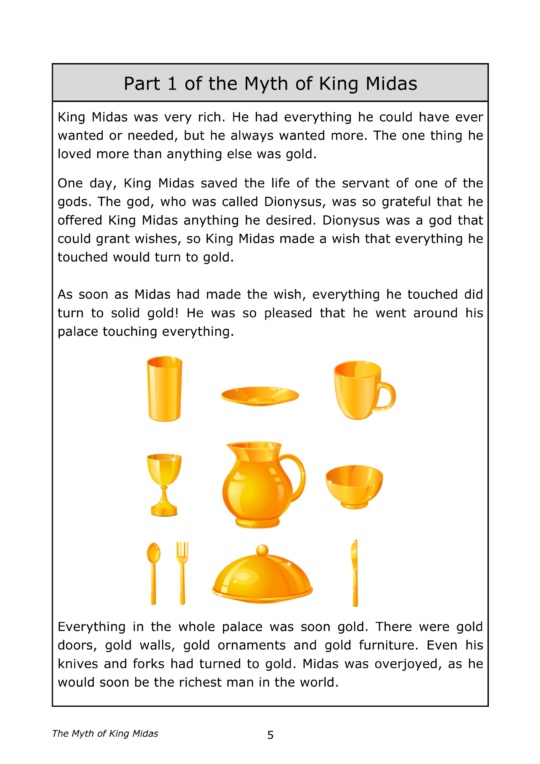
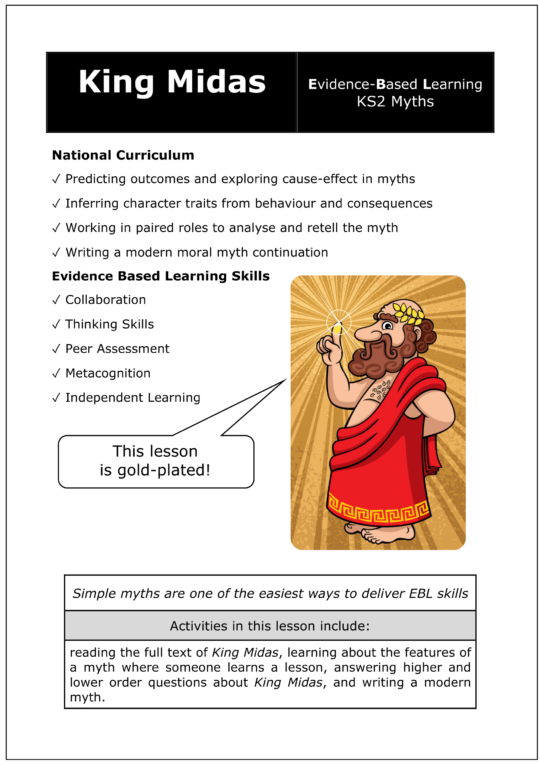
Y5 King Midas
£3.00 Add to basket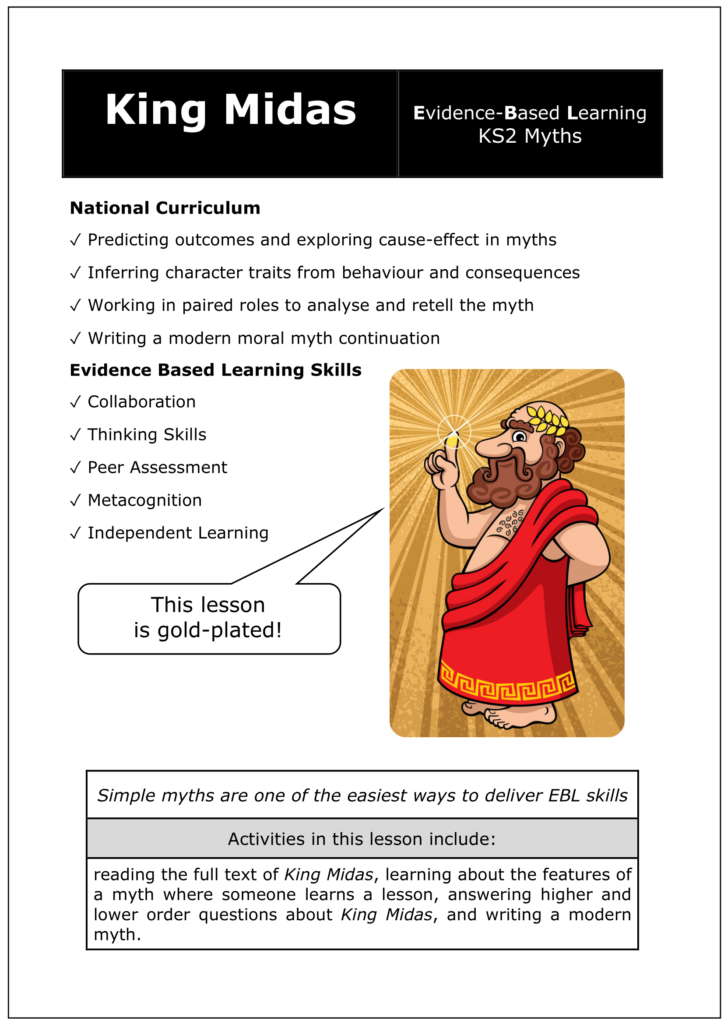 £3.00Add to basket
£3.00Add to basketKS2 National Curriculum:
✓ Predicting outcomes and exploring cause-effect in myths
✓ Inferring character traits from behaviour and consequences
✓ Working in paired roles to analyse and retell the myth
✓ Writing a modern moral myth continuationActivities in this lesson include reading the full text of King Midas, learning about the features of a myth where someone learns a lesson, answering higher and lower order questions about King Midas, writing a tweet and writing a modern myth.
There is a five-minute evidence-based CPD activity at the end of this lesson which will develop classroom teachers’ skill set. This CPD consists of a research extract on peer assessment with a five-minute activity based on this extract.
VIEW -


Y6 Science Fiction is Alien to me
£3.00 Add to basket £3.00Add to basket
£3.00Add to basketKS2 National Curriculum:
✓ Structuring narrative writing; using descriptive language and varied sentence structures.
Activities in this lesson include a reminder of the features of science fiction stories, a step-by-step guide to structuring a science fiction story (which uses guided questions), using adjectival phrases and finally, writing a science fiction story.
There is a five-minute evidence-based CPD activity at the end of this lesson which will develop classroom teachers’ skill set. This CPD consists of a research extract on peer assessment with a five-minute activity based on this extract.
VIEW -


Y5 Robots Got Talent
£3.00 Add to basket £3.00Add to basket
£3.00Add to basketKS2 National Curriculum:
✓ Identifying structure and themes; participating in discussions and presentations.
Activities in this lesson include learning about common themes for science fiction stories, the structure of a science fiction story, the main features of science fiction stories, how to design a poster and creating a poster showing the key features of science fiction stories.
There is a five-minute evidence-based CPD activity at the end of this lesson which will develop classroom teachers’ skill set. This CPD consists of a research extract on peer assessment with a five-minute activity based on this extract.
VIEW -


Comparing Early and Later Traditional Stories (II)
£3.00 Add to basket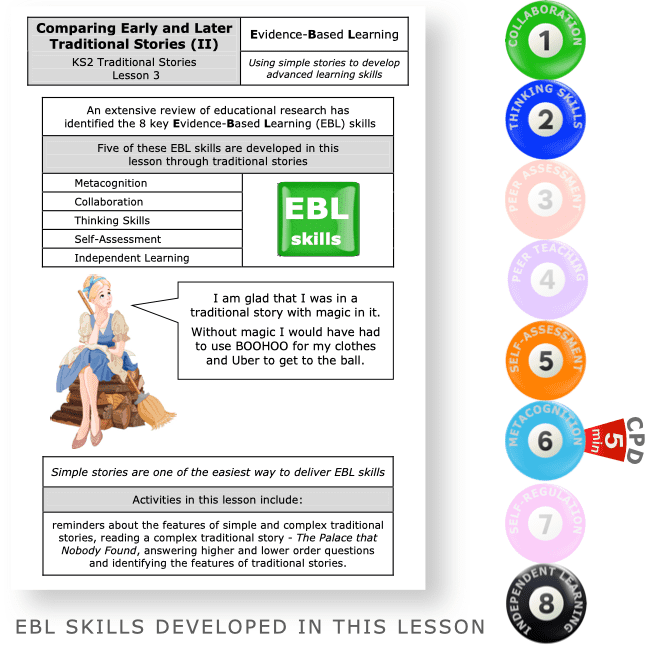 £3.00Add to basket
£3.00Add to basketActivities in this lesson reminders about the features of simple and complex traditional stories, reading a complex traditional story – The Palace that Nobody Found, answering higher and lower order questions and identifying the features of traditional stories.
There is a five-minute evidence-based CPD activity at the end of this lesson which will develop classroom teachers’ skill set. This CPD consists of a research extract on metacognition with a five-minute activity based on this extract.
VIEW

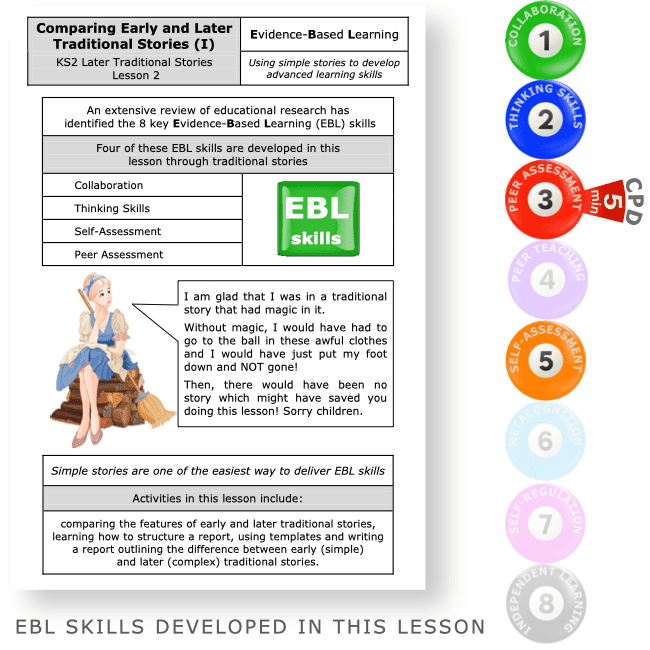








Philipem (verified owner) –
We asked a.i. to review this lesson. This is what it said:
Analysing Traditional Tales: A ⭐⭐⭐⭐⭐ Cross-Curricular Resource
Seeking an engaging way to advance literacy and critical thinking together? This excellent KS2 traditional story lesson exploring early and late tales is a complete English resource ideal for building reading, writing, comparison and more.
Students will analyse the key features of traditional stories, applying this knowledge to identify differences between simpler early and more complex later traditional tales. Comparing settings, characters and plot complexity develops textual comprehension. Collaborative report writing then reinforces understanding.
Vital evidence-based skills are seamlessly integrated too. Peer assessment strengthens analytical abilities. Self-assessment teaches students to critically evaluate their own work. And the 5 minute teacher CPD activity models reflective practice – considering what worked to improve future lessons.
With its blend of reading, comparison, analysis, discussion and joint writing tasks, I’d give this ready-made early and late story lesson 5 stars. It meets UK curricular goals for advancing literacy and higher order skills via immersive content. Students will love contrasting the tales as they progress communication abilities with this high quality cross-curricular resource.